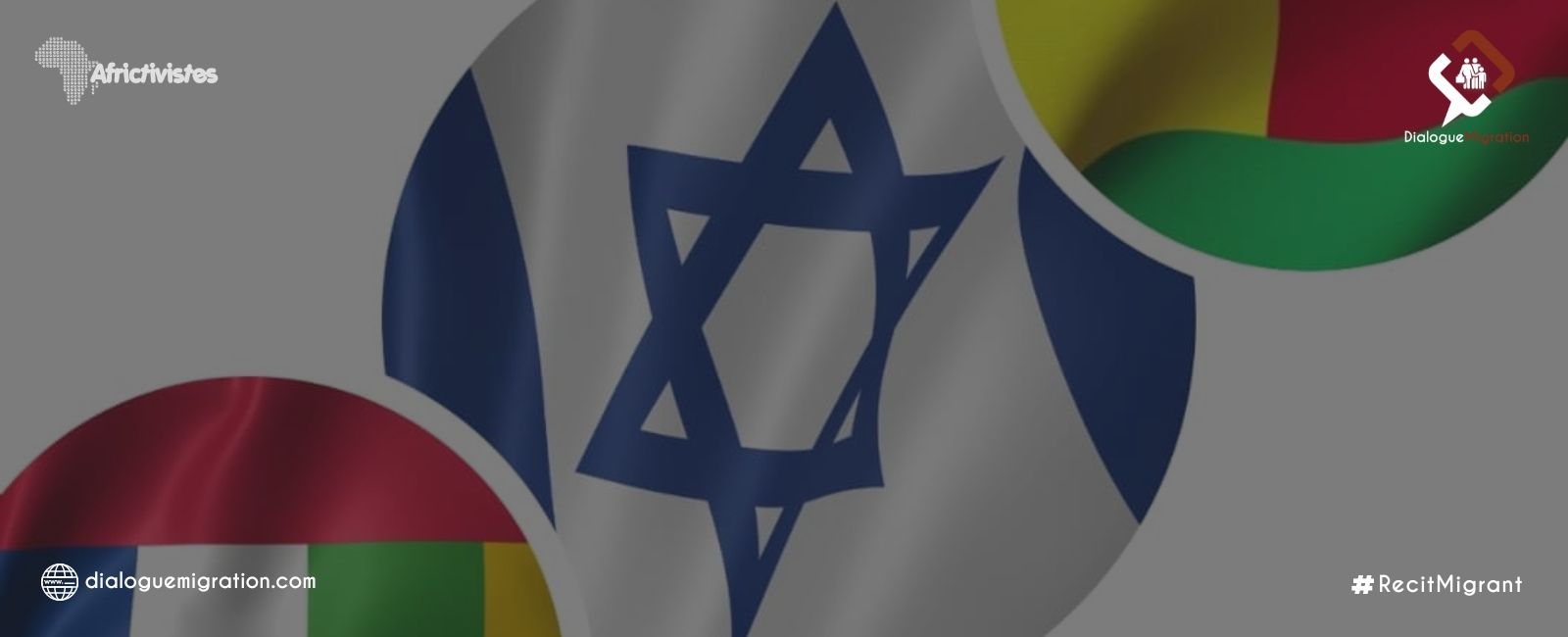

One out of eight E young migrants in the world seek to improve their livelihoods and 4.3% of them study in foreign universities, according to the official report of the International Dialogue on Migration (IDM) published in 2020. The young Central African, Fabrice, who is among these young migrant students, met Dialogue Migration in Cotonou where he settled his family temporarily.
Fabrice, a young Central African in his thirties, left his country in 2011 to study in Israel. After a few years of intense study dotted with trips between Africa and the Middle East, he finally graduated with a Master’s degree in Management and landed a job in the hotel industry in Israel. A country, he says, he admires for its structure and opportunities, while noting the proportion represented by the black community.
It was in the heart of Cotonou, the economic capital of Benin, that Dialogue Migration met him while he was presented as the manager of a fast-food restaurant in the vicinity of the Stade de l’Amitié Général Mathieu Kérékou in Kouhounou, a very lively district, day and night, crossroads of sports and other leisure activities. Once contact is established, Fabrice opens the pages of his story as a young Central African in Benin, far from his country of origin and his adopted country of Israel.
Fabrice’s story is that of many young Africans in search of a better tomorrow, through higher education outside their country and even everywhere on the continent. The reason is quite simple, as he himself puts it: “In order to offer ourselves better opportunities for social success and socio-professional integration, I went for studies in Israel where I got a Master’s degree in Management,” he says.
Indeed, the official report of the International Dialogue on Migration (IDM) published in 2020 reveals that of the 258 million international migrants identified in 2017, 90% come from developing countries. The report notes that 1 out of 8 young people in migration seek to improve their livelihoods and 4.3% study in foreign universities.
In a publication entitled “International migration for studies: mobility factors and North-South inequalities“, published in 2009, Eugénie Terrier notes that since the 90s, factors of a more economic nature have become more important. The internationalisation of academic training has taken place in parallel with the globalisation of the labour market. In today’s globalised economy, international mobility for studies is socially valued because it is presented as a guarantee of skills recognised by employers. Having studied abroad is synonymous with better foreign language skills, flexibility, open-mindedness, ability to adapt to cultural differences, all skills that are supposed to be sought after by the human resources departments of companies integrated into the global economic market, she concludes.
Apart from his departure, which is justified by the quest for better training and opportunities in terms of employability, Fabrice must also confront the socio-political situation in his country of origin, the Central African Republic, shaken by political instability. A situation that he evokes with a twinge in his heart.
Reasons for leaving for to the developed world
The Central African Republic is shaken by socio-political instability. In the article “Main causes of extra-continental African migrations” published in 2022 by Roméo Gbaguidi, Professor-Researcher, Director of LemAfriQ, among the main reasons for sub-Saharan extra-continental migration, it is listed among others: the search for better living conditions or even survival; the lack of real employment opportunities, especially for young people; the mismatch of professional skills to the labour market local; the weight of tradition and social factors; reunification of family members, especially with regard to women; the political situation (political instability in some countries in the region); selective attacks and persecution (ethnic, sexual orientation, political or religious ideology); corruptions in different forms, social injustices (classicism)…
Living in Tel Aviv, Fabrice returned for his holidays to Cotonou in Benin where his family lives. His country, the Central African Republic, has been plunged into a socio-political crisis in recent years. So, to protect his wife and children from the risk of insecurity, Fabrice took the option of moving them from Bangui, the capital. This, after seeking the opinion of his relatives for a destination where the cost of living would be relatively cheaper. It was after exchanges and in view of his experience in some countries of the subregion he visited for various reasons, that he finally opted for Benin. His two children are in school, pending the end of the school year in June, and the finalisation of their visas, he spends some time in Cotonou. “I’m just waiting for my children to finish the school year to go back to Israel with my little family. The time also for their visas to be ready,” he says.
Meanwhile, Fabrice manages during the day a fast-food restaurant belonging to one of his neighbours in Cotonou, just to take advantage of the time he spends at home twiddling his thumbs. “At home in the Central African Republic, the situation is very delicate. And there is insecurity. That’s why I preferred to shelter my family here in Benin, for almost five years, until they could join me in Israel where I live,” he says.
For him, the main reason for the departure of many young Africans is quite simple: “the mismanagement of governments is there, the basis for the departure of young people. If we had better conditions in terms of training and opportunities, in terms of job opportunities, I think many young people would not migrate.” Better still, he mentions some who are forced to leave opting for better conditions at the cost of their lives. “I think if people had a choice, they wouldn’t take to the sea to go to Europe, cross the desert, or know about the atrocities happening in Libya and whatever… ” he says.
Fabrice seems so preoccupied, so embarrassed when talking about the phenomenon of the so-called irregular immigration. From his experience, he knows a lot about life outside his country of origin, even if for his immigration project, he opted for legal channels.
After his stay in Senegal, then in Niger, Fabrice attests to African hospitality. Employed in the hotel sector in Israel, the holder of a master’s degree has no problem talking about realities in the country. Even for him, the black African community, although a minority, seems well integrated and respected: “There is no discrimination, but there are many Africans in the service sector,” he says.
“If you go down there, you have the latitude to do whatever you want. But when you do something that is outlawed, you are quickly identified and expelled. Even before you come, they know who you come to see and access is very filtered. But there are opportunities, even French people are leaving Europe to come to Israel to settle and work. When they see that you have an unscrupulous visitor, they ask either you go out and he stays or the visitor goes,” he explains.
Fabrice still remains attached to his continent and his country even if for the moment his family reunification project in Israel is one of his priorities.


